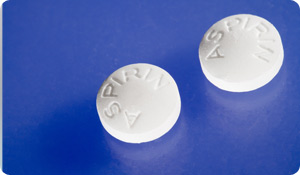
Although aspirin has been around for more than 100 years, chances are your doctor or pediatrician tends to recommend ibuprofen or acetaminophen (Tylenol) for pain and fever relief. And while those remedies do a great job, aspirin, also known as acetylsalicylic acid, may still have a valuable place in your medicine cabinet.
Pain Relief and More
What can aspirin do? A standard (325 mg) or extra strength (500 mg) dose is an effective pain killer, for one thing. "The relief of mild to moderate pain is a major action of aspirin in daily use," says Marc I. Leavey, MD, a primary care specialist at Mercy Medical Center in Baltimore. "From muscle aches and pains to menstrual cramps to dental pain, aspirin is as good a pain reliever as anything else available over the counter for these common complaints."
Aspirin also works as an anti-inflammatory drug, making it a possible therapy for people who suffer from conditions in which inflammation plays a part, according to Leavey. These include rheumatoid arthritis, osteoarthritis, lupus, and mixed connective tissue disease.
Several recent trials have also revealed other possible uses for aspirin. A study presented at the American Thoracic Society International Conference in Denver last year indicated that emphysema patients who took aspirin at least three times a week over a 10 year period appeared to have a slower progression of the deadly lung disease. And when researchers in Wales looked at the results of 47 different studies on aspirin use in patients with breast, bowel, and prostate cancer, they found that low-dose aspirin use, along with other treatments, seemed to reduce the incidence of death by 15- 20 percent. Other studies suggest that regular aspirin use helps keep certain cancers, such as colon cancer, from developing in the first place.
Aspirin's affect on cardiovascular (heart and blood vessel) health has even prompted the U.S. Preventive Services Task Force to recommend that people between ages 50 and 69 at risk of cardiovascular disease consider taking a low-dose aspirin—81 mg a day is a suggested amount—every day, as aspirin use has been shown to decrease cardiovascular events in this age group.
Who Shouldn't Take Aspirin?
However, aspirin isn't for everyone: People at risk increased bleeding may want to avoid it. That's because "Aspirin interferes with the ability of platelets [blood cells that clump together to prevent excessive bleeding] to stick together to form a platelet plug," says Leavey. "This makes aspirin quite useful in diseases caused by such clots, from heart attacks to strokes, and some forms of peripheral vascular [blood vessel] disease as well."
However, for some people, aspirin's affect on platelets can be a problem. Who should be wary?
- People who tend to bleed easily, such as those who have low platelet levels or certain types of blood disorders.
- People who have had ulcers or other conditions causing gastrointestinal (stomach/intestinal) bleeding—the most common kind of bleeding resulting from aspirin use.
- Anyone with balance problems who’s at risk of falling and hitting his or her head—this could lead to a brain bleed.
In addition, children and teens should not take aspirin—not due to bleeding concerns, but because aspirin can cause Reye's Syndrome, a rare but potentially fatal condition. It's most common in young people who are recovering from either chicken pox or influenza, and can cause inflammation in the brain and liver.
If you're prone to bleeding or balance problems, "Aspirin might not be right for you, unless your risk of a cardiovascular problem is very high," says Kathryn A. Boling, MD, a primary care provider at Mercy Medical Center. Nonetheless, consider your options and speak to your physician: "It’s a personal risk assessment."
Marc I. Leavey, MD, and Kathryn A. Boling, MD, reviewed this article.
Sources
Leavey, Marc I., MD. Mercy Medical Center. Email correspondence with source on June 11, 2016.
Boling, Kathryn A., MD. Mercy Medical Center. Phone call with source on June 10, 2016.
"Aspirin and Related Drugs." University of Washington Medicine Orthpaedics and Sports Medicine. Page accessed June 20, 2016.
Aaron, CP, JE Schwartz, EA Hoffman, R Tracy, JHM Austin, LJ Smith, DR Jacobs, KE Watson, RG Barr. "Aspirin Use and Longitudinal Progression of Percent Emphysema on CT: The MESA Lung Study." American Journal of Respiratory and Critical Care Medicine (2015); Abstract 6354. doi: 10.1164/ajrccm-conference.2015.191.1_MeetingAbstracts.A6354.
"Final Recommendation Statement--Aspirin Use to Prevent Cardiovascular Disease and Colorectal Cancer: Preventive Medication." U.S. Preventive Services Task Force. Last reviewed April 2016.
"Aspirin." PubChem Open Chemistry Database, U.S. National Library of Medicine. Accessed on June 13, 2016.
Elwood PC, G Morgan, JE Pickering, J Galante, AL Weightman, D Morris, M Kelson, S Dolwani. "Aspirin in the Treatment of Cancer: Reductions in Metastatic Spread and in Mortality: A Systematic Review and Meta-Analyses of Published Studies." PLOS ONE (April 20, 2016).
"Daily Aspirin Therapy: Understand the Benefits and Risks." Mayo Clinic. Last updated November 3, 2015.
"What are Platelets and Why are They Important?" Johns Hopkins Medicine. Accessed on June 17, 2016.
"Reye's Syndrome." Mayo Clinic. Last updated August 12, 2014.





